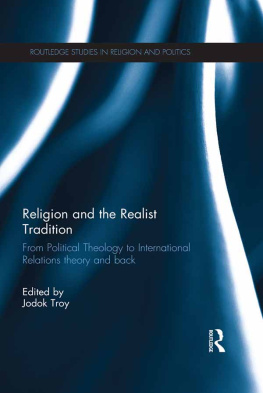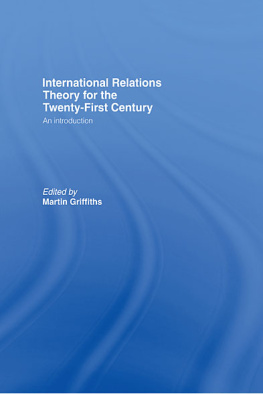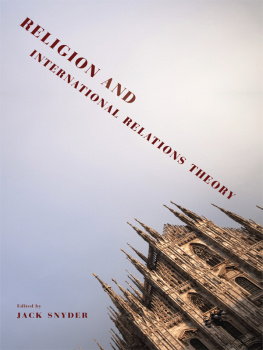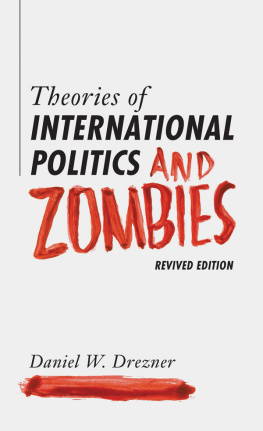The Social Evolution
of International Politics
Shiping Tang
- Great Clarendon Street, Oxford, OX2 6DP,
- United Kingdom
- Oxford University Press is a department of the University of Oxford.
- It furthers the University's objective of excellence in research, scholarship,
- and education by publishing worldwide. Oxford is a registered trade mark of
- Oxford University Press in the UK and in certain other countries
- The moral rights of the author have been asserted
- First Edition published in 2013
- All rights reserved. No part of this publication may be reproduced, stored in
- a retrieval system, or transmitted, in any form or by any means, without the
- prior permission in writing of Oxford University Press, or as expressly permitted
- by law, by licence or under terms agreed with the appropriate reprographics
- rights organization. Enquiries concerning reproduction outside the scope of the
- above should be sent to the Rights Department, Oxford University Press, at the
- address above
- You must not circulate this work in any other form
- and you must impose this same condition on any acquirer
- British Library Cataloguing in Publication Data
- Data available
- Printed and bound in Great Britain by
- the MPG Printgroup, UK
Dedication
(p.v) To Charles Darwin and Jean-Baptiste Lamarck
One hundred [and fifty] years without Darwinism are enough.
Hermann. J. Muller,
Give Darwin his due.
Philip Kitcher,
(p.vi) Preface
In 1959, the centennial of Darwins Origin of Species, H. J. Muller (Nobel Prize winner in biology and medicine) lamented: one hundred years without Darwinism are enough. Mullers lamentation rings even more true in social sciences. More than 150 years after Origin of Species, most social scientists remain ambivalent, if not hostile, toward applying an evolutionary approach to the understanding of human society. This apologetic mentality for being a social evolutionist, I contend, must be resolutely rejected, if human society is to be adequately understood. Social scientists should unabashedly embrace evolutionary thinking and become social evolutionist, for nothing in human society makes sense unless in the light of social evolution, to paraphrase Dobzhansky ().
Elsewhere, I show that when stripped to the bare bone, there are only eleven foundational paradigms in social sciences, and all the major schools or approaches in social sciences have been the product of different combinations of these foundational paradigms (Tang ). I further argue that an evolutionary approachor more precisely, the social evolution paradigm (hereafter, SEP)is the most powerful of them all: SEP is theultimate paradigm of social science. And in an accompanying volume, I elaborate what social evolution is as a phenomenon and what social evolution is as a paradigm. That book is designated to help social scientists understand social evolution and deploy SEP in understanding the human society.
In this book, I apply SEP to examine the systemic transformation of international politics from the beginning of human history (c.11,000 BC) to today. Along the way, I also offer an evolutionary (and neat) resolution of the Great Debates in IR. By doing so, I seek to showcase the explanatory power of SEP. This book is thus as much a book for IR scholars (and political scientists) as for all social scientists.
Together with other social scientists work and my other works that deploy SEP (Tang ), I hope at least some social scientists will be convinced that SEP is a paradigm with great explanatory power, thus ending social sciences years without social evolutionism after more than 150 years. More than 150? years ought to be more than enough.
This project has taken far longer than I expected. Even with the long hatching time, however, this book would not have been possible without the generous (spiritual and financial) support of several institutions. Let me take this opportunity to express my gratitude to the Institute of Asia-Pacific Studies (p.vii) (IAPS), Chinese Academy of Social Sciences (CASS), Beijing, and the S. Rajaratnam School of International Studies (RSIS), Nanyang Technological University (NTU), Singapore, with special thanks to Director Prof. Zhang Yunling of IAPS and Dean Ambassador Barry Desker of RSIS. Under their able leadership, these two institutions provided me with a stimulating working environment.
I also thank Prof. Wang Gungwu for hosting me as a visiting fellow at East Asian Institute of National University of Singapore in 2005, so that I could work out some of the details of social evolution and a social evolutionary approach toward international politics and broader human society. More importantly, having the opportunity to learn from a great historian like Prof. Wang who embodies wisdom is something that most students can only dream of, and I have been extremely lucky.
I have benefited greatly from criticism by many individuals. From the broad IR community, they include Amitav Acharya, Barry Buzan, Sen Du, Jeffrey Legro, Bob Jervis, Ned Lebow, Jon Mercer, Xiaoyu Pu, Sow Keat Tow, Alex Wendt, and Li Xue. I also thank Chris Roberts for sharing his unpublished data on ASEAN elite opinion survey.
From anthropology, archaeology, and the broader community on social evolution, Guillermo Algaze, Marion Blute, Geoff Hodgson, and Richard Nelson saved me from some basic mistakes in integrating data and insights from their respective fields into this book.
At Oxford University Press, Dominic Byatt has guided this project with patience, wisdom, and spirited encouragement. By taking on a project that seems to be so out of place with the larger social science literature, Dominic has put his judgment on the line. I can only hope this book vindicates his judgment, at least somewhat.
My gratitude also goes to four special friends: Tao Cui, Hongmei Li, Honglin Li, and Yu Zhang. Their unflinching faith in me has always been an inspiration and an extremely important source of support, encouragement, and understanding. Leslie Fong, Jin Han, Xin Yanspecial friends and mentorstaught me things that I could not possibly learn by reading books.
Over the years, I have had the fortune of working with some outstanding research assistants. Yong-peng Fang provided not only excellent research assistance but also useful discussion on the European system. Shan Yang went the extra mile in compiling the bibliography. Beatrice Bieger, Candis Pang, Rongfang Pang, Hon Yang, Yuan Yang, and Lixia Yao have all made my labor less painful. Former and current graduate students of mine, Jiangchun Li, Ruolin Su, Kai Wang, Jingyi Zhang, Min Zhang, and Yiqi Zhou, have also provided some much needed help.
My new colleagues and friends at Fudan Univeristy have made my moving to Fudan a pleasant and productive experience. Yugang Chen, Zhimin Chen, Junzhi He, Zhan Hu, Ruichang Li, Jianjun Liu, Yi Shen, Changhe Su, Chenqiu (p.viii) Wu, Kaiya Wu, Xinbo Wu, and Qin Zhu have shared coffee, tea, and (unfortunately, sometimes) cigarettes during the numerous but necessary breaks that have made the writing process a bit more lighthearted. Several graduate students have embarrassed their professors ruthlessly, for which I am deeply grateful. I shall name at least Lifeng Xu and Xiyin Zuo.










